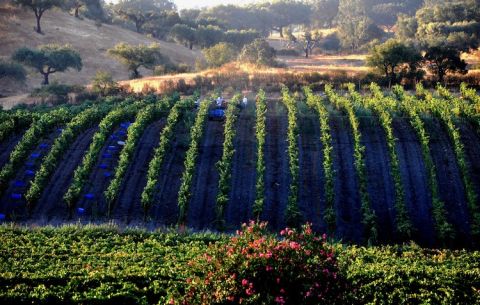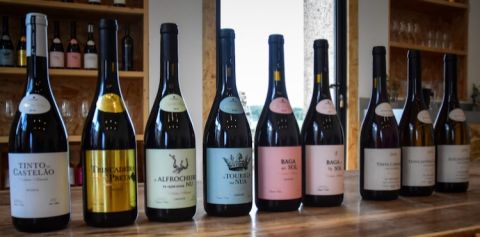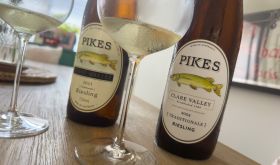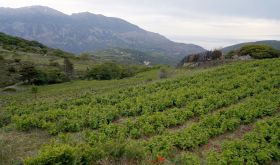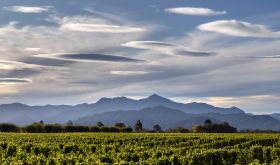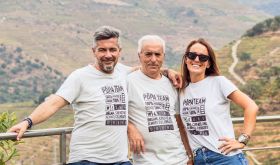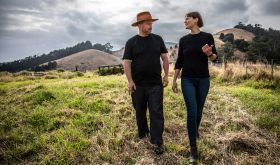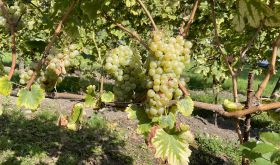From £15.88, 149 Swedish kronor, 15.90 Swiss francs, $19.97, €20, CA$39.40
I first tasted Fitapreta wines from Portugal’s sunny Alentejo region back in 2008, and included their excellent Palpite Reserva Branco 2009 in my Portuguese top 50 but it wasn’t until this year that I met the company’s winemaker and co-founder António Maçanita, at the volcanic wine fair in the Auvergne. I was fortunate to meet his co-founder, English viticulturist David Booth, in London, the year before he died so terribly young. The team (below) get together on 16 April every year to celebrate David's life.
At the volcanic fair I tasted Maçanita’s distinctively Atlantic- and volcanic-influenced wines from the Azores Wine Company (scroll down to Portugal in this article to find my notes) but as we were talking, I discovered that, coincidentally, António’s wife Alexandra Leroy Maçanita had just sent me some samples of Fitapreta wines. (As if the two businesses and the Lisbon–Pico commute were not enough, he shares another project in the Douro with his winemaker sister Joana.)
These samples included A Touriga Vai Nua 2018 ('Touriga goes naked') in their Signature Series, made without any oak influence in order to ‘capture Touriga’s floral perfume’. I’ve tasted some wines made exclusively from Touriga Nacional where this fragrance – often a combination of violets and bergamot (think Earl Grey tea) – is almost too much and thought the wine might have been better as a blending component. But not here.
Touriga Nacional probably originated in the Dão region and has long been valued for port wines in the Douro but the success of Douro table wines has given it even greater prominence on wine labels. It is now increasingly popular throughout the country and has found its way to places as far afield as California, Brazil, Australia, New Zealand and Washington state.
In hotter regions such as the Alentejo, Touriga Nacional can be less aromatic, which is why this one stands out: the fragrance is wonderful, neither OTT nor lost because of the climate or the winemaking, and was even better the day after opening. The tannins, which with this variety can be dense and in need of bottle age, are also so well handled that you could approach this wine now. Here’s an extract from my tasting note:
'The aroma is glorious: sweet mulberry and blackberry but deeply floral too with that lovely note of bergamot and even a touch of peony that I rarely see on Touriga when it is oaked. It's even more aromatic the day after opening. The aroma is so lovely, I hesitate to put the wine in my mouth because I want to make the aromatic pleasure last. The tannins are as impressive as the aroma, knowing that Touriga has firm tannins that are usually softened by oak. Here they give a gentle but confident structure that shapes the fruit and the perfume. A class act with a long, dark-fruited finish. Impressively fresh for a wine of 14.5%. At the very end, after you have swallowed the wine, you get a wave of fragrance again – of red/blue fruits and a touch of bergamot.'
When I first tasted it, I gave it a score of 16.5 but when I went back to it the next day, it was still so beautifully fresh and scented that I increased my score to 17 and gave it a suggested drinking window of 2020–2023 although it is pretty irresistible now and may lose some of its hallmark fragrance as it ages. I see that Ali Cooper MW also enjoyed the 2018 – lightly chilled – at the Dirty Dozen tasting at the end of last year.
But it's not just about the aroma, the shape and the balance are also excellent for a wine with no make-up. In fact I'd describe it as a wine with 'natural' beauty, even if the term 'natural wine' has been colonised these days.
The vines (below) grow in schist soils and the nights during ripening are cool, which helps retain the freshness. The hand-picked grapes are gently crushed and moved by gravity to stainless-steel tanks, then fermented with ambient yeasts. The wine spends three months in tank before bottling.
I asked António about his use of oak and whether he was using less and less in general:
‘I have been doing several trials on this since 2013, testing stainless steel compared with used and neutral oak on higher-end wines. And I believe that there’s something interesting here, mostly in warm climates where the roundness is already there through the ripeness of the fruit, and the need for extra micro-oxygenation, with the sacrifice of the pureness of the fruit, is questionable.’
But his reply was nuanced, showing his responsiveness to each variety and each wine: in an experiment in 2015 with the often tougher-tannined Baga variety, he thought he would prefer the unoaked version but admitted to liking the wine that had been aged in older oak. And better still, a blend of the two.
As well as the A Touriga Vai Nua, there are another 11 wines in the Signature Series and I would recommend all those I have tasted so far: Baga ao Sol (unoaked ‘Baga in the sun’), Branco de Indígenas (Arinto and Verdelho fermented in barrel without yeast inoculation or temperature control), Branco de Talha (Roupeiro and Antão Vaz fermented in amphora) and O Tinto do Pote de Barro (‘red from a clay pot’). This last wine was intended to be a Vinho de Talha, the official designation of such wines in the region, but was rejected by the local commission as atypical. Typical!




